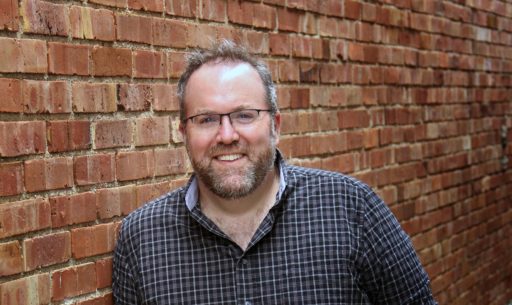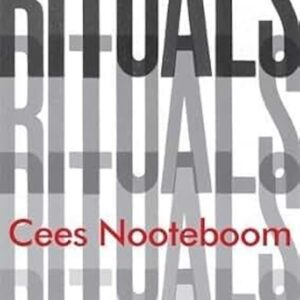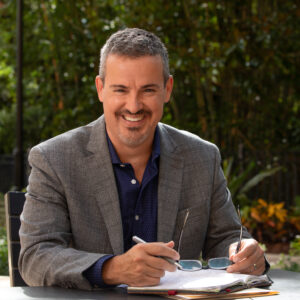We recently spoke with author Samuel Martin about his new Slant book, When the Dead are Razed.
This novel is set in Newfoundland, Canada, between a fictitious outport named St. Mark’s and the capital city of St. John’s. What’s your connection to this part of the world?
I lived in St. John’s when I was a graduate student and in Deep Bay on Fogo Island where I was Writer in Residence at the Bridge Studio through Fogo Island Arts. I first moved to St. John’s with my wife Samantha to pursue doctoral studies in Atlantic Canadian Literature at Memorial University because the fiction of Canada’s east coast has always captivated me. While living in the province I published my first book, set in eastern Ontario, and a second book, the novel A Blessed Snarl, set in Newfoundland.
Because I’m a CFA (a Come From Away), though, I try only to write about certain Newfoundland communities from an outsider’s perspective. In this novel, though all the characters (except Ike Battersea) are Newfoundlanders, the main character Teffy Byrne, is an outsider to the two main settings. She doesn’t belong in either the hip urban world of St. John’s or the north shore outport of St. Mark’s, and she sees those two places from the perspective of someone who doesn’t have the inside scoop but is trying desperately to understand.
That’s me, more or less. Though Teffy, as you’ll see, has her own secrets and backstory, and those don’t bear any resemblance to mine! The main thing that drove the writing of this book is that I love the island of Newfoundland, its people, its arts and literary culture, its music. I started writing this book before we left Newfoundland and I’ve been working on it for the past eight years. So in some ways it’s like a love letter to a place I miss terribly: a letter written in the form of literary thriller.
A lot of contemporary crime fiction takes a detective or cop as the lead character, but in your book the cop is a very minor character. Why did you chose Teffy Byrne, a maverick reporter for a low-budget online news site, as your main character?
Although I like a classic closed room sleuthing story or police procedural as much as most fans of crime fiction, I am most interested in why and how regular people wind up committing or accused of crimes. Often, though not always, that’s the realm of noir. In some important ways, detectives and cops function like super heroes in this genre with noir anti-heroes being their counterparts: their dark doubles.
For instance, Sherlocks have phenomenal powers of perception, and cops—from Ian Rankin’s Rebus to James Lee Burke’s Dave Robicheaux—have all the resources of modern policing, at least when they’re not suspended from the force. The latter happens a lot in noir.
My character Teffy Byrne, though, doesn’t have any of those things. And I know from friends who’ve run online magazines and papers that such ventures don’t make you rich and often barely pay the bills. There’s no extra cash lying around in this novel. Teffy has nothing to make her investigations easier. She doesn’t have the upper middle class financial security of many sleuths and she doesn’t have police resources either.
That sort of ordinariness, those mundane limits, are something I understand and am most interested in. Like the working class characters in David Joy’s Appalachian noirs, Joe R. Lansdale’s Hap and Leonard stories, or Joel Thomas Hynes’s Newfoundland novels, my characters are not well off and find themselves involved in crime often as ways of covering past mistakes or paying debts or by simply being in a position to be exploited by those more powerful, whether that power is financial, political, social, or religious.
I’m intensely interested in the complexities of ordinary crime, like in the stories of Kevin Hardcastle: a world without mastermind Dr. Evils and I-can-solve-anything Sherlocks. But a world where those with power do exploit the weak for their own protection or benefit. I’ve seen that reality, from domestic abuse that’s touched people I care about to misogyny, racism, and sexism in the workplace. I wanted to write a story, though, in which the weak fight back: in which a character like Teffy finds her own strength, her own reasons to keep going—to endure. But without any easy outs or unearned cynicism. That’s the kind of struggle—the kind of story—that hooks me.
Where does the title When the Dead are Razed come from? What’s the story there?
“When the dead are raised” is a biblical phrase used in passages when the resurrection is invoked, a hope for life after death. I’ve found, though, that talk of resurrection, in religious circles, often becomes a way for religious people to bypass dealing with the actual realities of death. If a person’s life meant something to you, though, then their death is worth mourning. Mourning is the strange privilege of those who lose the ones they love. But it’s hard, it’s a constant struggle, to do what Nicholas Wolterstorff says in Lament for a Son: “to resist amnesia, to renounce oblivion.”
That’s what I wanted to capture in the title: that drama between erasure and remembering. When the dead are razed or forgotten they cannot be raised and remembered. When their deaths are left uninvestigated or their killers set free, then there is no justice. Not for them, not for us. When women and girls are murdered or go missing and nothing is done, then their lives are being treated by the dominant culture, by those with power, as worthless, as something that can be levelled, burned to ash, scattered on the wind and forgotten. I wanted to explore a story that worked against that impulse to forget, a story that investigated the reasons why we too often prefer oblivion and erasure. I wanted to write a story that explored the dangers of forgetting the dead, no matter who they are, because no matter who they are they deserve to be remembered. They deserved to be treated as humans. So there’s a tension in the novel between those who want to remember and avenge the dead and those who want the dead burned, scattered, and forgotten.
What was the process of writing this book like?
Well, the summer I wrote the first draft, we were renting a student apartment on a community college campus near the camp where my wife Samantha worked and my eldest son—our only child at that point—was just learning to walk and not yet napping or going to sleep consistently. When I finished that draft at the end of that summer I felt a bleary-eyed, sleep-deprived sense of triumph.
But that was seven years ago now, and I’ve substantively re-written the novel at least once a year since then. And by substantively, I mean complete story arches being scrapped, main characters becoming minor characters and then getting written out of the story completely and new characters being invented. People have been killed in one draft and resurrected in another and vice versa.
Writing this book has seemed like a years-long trudge through waist-deep snow, uphill both ways. Seriously. Since I started this project I’ve lost my job twice—at the same college! They cut my position, then my department fought to have my position reinstated, only to have my whole major and position cut again two years later in the middle of an immigration process, in which my family is still snarled.
Samantha and I are now parents to four children (ages 7, 5, 2, and 9 months). And Samantha, up to this past summer, was the assistant program director at a camp for individuals with disabilities, so she worked crazy long hours every summer and I got to play with the kids and try to write or edit in those rare lulls between meals, sibling disputes, and “creative” crises.
I now know, for instance, that dry-erase marker can remove magic marker from some surfaces. And on top of all that craziness, both Samantha’s father and my father were diagnosed with Parkinson’s. Then, of course, 2020 hit, and well…yeah. So, the fact that this novel even exists is kind of cool for me. It’s something that literally would not exist without Samantha, without our kids, or without the readers along the way who kept pushing me to keep at it.
What experiences or events in your life helped shape or inspire this book?
This book was started on Fogo Island, during a writer residency, and I was able to return the following summer to Tilting, an Irish outport on Fogo where I’d met friends willing to take me out to a small set of islands called Little Fogo where there are still houses and an old Catholic church. That’s where I got the idea for St. Mark’s and the Kid Brothers offshore.
That setting and those experiences—the conversations in sheds and kitchens with locals and fishermen and folks who worked at the island’s fish plant—all those things in some way inspired the book. It’s a crime thriller, sure, which is where the fiction comes in.
Hopefully it’s a story even non-readers will want to read. But I really wanted it to come from those conversations I enjoyed with those people, and with some friends from the South Shore and St. John’s too. I wanted those people to be able to read a fun, fast-paced book that’s also a serious book and to see that I was listening to them and that I care for them deeply and the particularities of their lives.
What influences shaped you as a writer?
The fiction of Canada’s east coast is probably my major influence so far. I owe a lot to David Adams Richards’s work and to his mentorship and support of my early writing. His classic Mercy Among the Children is to date the only book that has made me physically shake while reading it.
And, of course, contemporary Newfoundland writers have also had a huge impact, and many of them have been very supportive of my work, especially writers who, when I was getting my start, were emerging writers themselves, like Chad Pelley and Megan Gail Coles.
Other writers who had a big impact on me were Larry Mathews, Trudy Morgan-Cole, Michelle Butler Hallett, Jessica Grant, Leslie Vryenhoek, Anna Marie Beckel, Mary Dalton, Boyd Warren Chubbs, and Kevin Major. And I was also reading and learning from other Newfoundland writers like Michael Crummey, Wayne Johnston, Michael Winter, Lisa Moore, Joel Thomas Hynes, and Kenneth J. Harvey. I would not be the writer I am today if not for the supportive literary community of St. John’s, where I’m pretty sure there must be something like a reading or new book launch at least once or twice a week throughout the year.
Other influences beyond Newfoundland are writers like Cormac McCarthy, though I like Kevin Hardcastle’s McCarthy-esque prose in In The Cage better than most McCarthy novels. That might be a minority report or blasphemy in some quarters but it is true. Kevin Hardcastle is the real deal. My favorite McCarthy, by the way, is No Country for Old Men; even better than The Roador Blood Meridian in my opinion. And recently I’ve been learning a lot from Louise Penney, R.O. Kwon, Nicole Baart, Jussi Adler-Olsen, Daniel Cole, James Wilson (fellow Slant author!), Gabino Iglesias, and David Joy.





